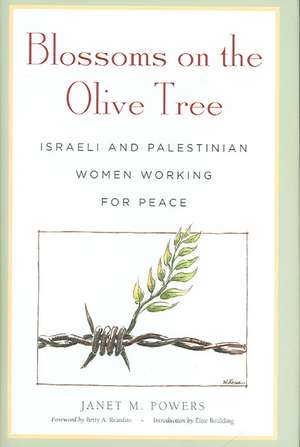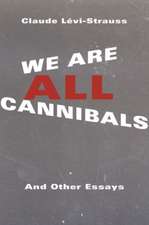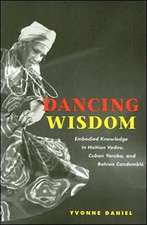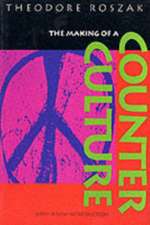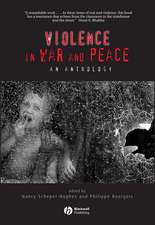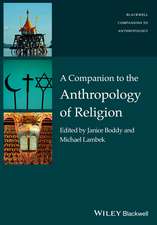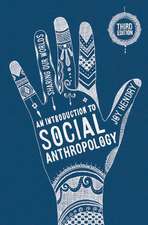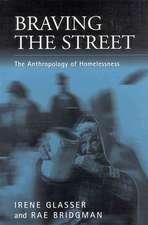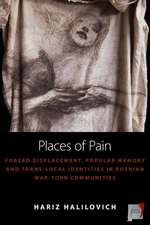Blossoms on the Olive Tree: Israeli and Palestinian Women Working for Peace
Autor Janet M. Powersen Limba Engleză Hardback – 29 mar 2006 – vârsta până la 17 ani
Preț: 345.42 lei
Preț vechi: 476.10 lei
-27% Nou
Puncte Express: 518
Preț estimativ în valută:
66.09€ • 69.19$ • 54.69£
66.09€ • 69.19$ • 54.69£
Carte tipărită la comandă
Livrare economică 05-19 aprilie
Preluare comenzi: 021 569.72.76
Specificații
ISBN-13: 9780275990015
ISBN-10: 027599001X
Pagini: 184
Dimensiuni: 156 x 235 x 20 mm
Greutate: 0.43 kg
Editura: Bloomsbury Publishing
Colecția Praeger
Locul publicării:New York, United States
ISBN-10: 027599001X
Pagini: 184
Dimensiuni: 156 x 235 x 20 mm
Greutate: 0.43 kg
Editura: Bloomsbury Publishing
Colecția Praeger
Locul publicării:New York, United States
Notă biografică
Janet M. Powers is Professor Emerita, Interdisciplinary Studies and Women's Studies, Gettysburg College. She has published extensively on literature from the Indian sub-continent. In recent years, her interests in peace studies and women's studies have converged in her research on Palestinian and Israeli women's peace-building efforts. She has also worked directly with women's organizations in Haiti, South Africa, Estonia, and India. She is a certified mediator.
Cuprins
PrefaceExtending the Olive BranchIsraeli and Palestinian Women in DialogueRuth's StoryNazmeih's StoryLiving in a Time of ConflictRefugee Camps and KibbutzimA City Divided: Jerusalem, West and EastTales of Two Cities: Ramallah and Tel AvivBethlehem, Haifa, and HebronDefining Political SpaceRebels in the Knesset and OutPatiently Preparing for StatehoodRunning for Office on Both SidesFinding Room at the Peace TableWorks Cited
Recenzii
US scholar Powers recounts recent grassroots efforts by Israeli and Palestinian women to educate themselves and their societies about building peace and solving problems nonviolently in the region. The author bases her study on research in 2002-05 in Israel and the occupied territories, including interviews, participation in demonstrations, and observations of the work of NGOs, feminist organizations, female politicians, and women's wings of political parties. She includes women's life histories and the testimonials of activist women among Israelis and Palestinians, demonstrating the difficulties of life for both sides because of the long-term military occupation of Palestine, human-rights violations, the new separation wall, and the violent political context. However, Powers never forgets the asymmetry of power between Israelis and Palestinians. The author bases her analysis on notions of women's marginalization, the way women are excluded from decision-making processes, and a context now allowing women an opportunity to engage in peace-building efforts. The volume includes photographs of key interviewees. The study's best feature is the way the author includes the human dimensions of the struggle for effective participation in the emerging binational dialogue. Recommended. All academic levels/libraries.
Powers had done extensive research in South Asia before her first trip to the Middle East in 2002. On that trip and later ones, she met Israeli and Palestinian women who were articulate, effective organizers, and committed to building personal and organizational connections to prepare the way for peace. Here she offers a collection of stories and essays describing the women she met and their peaceful responses to the hatred and violence in the region..[t]he book is a humane and moving presentation of women managing to work with courage and optimism for a better world. Libraries will want to make this volume available for readers seeking the human side of the harsh news from the Middle East.
Janet Powers..[o]ffers an American academic's account of living and engaging in dialogue with Palestinian and Israeli women who have been pushing for dialogue and peacemaking across the Israeli-Palestinian divide..The result of her time spent in the Middle East is a collection of stories and essays describing how inividual women and NGOs struggle to offer peaceful responses to conflict, violence, and hatred..The book also discusses numerous other gendered and nongendered peace and justice organizations among Palestinians and Israelis.
[A] collection of stories and essays about the work that Israeli and Palestinian women are doing, in spite of societal restraints, to engage in bi-national dialogue. The first section introduces four organizations that work to bridge the divide between Israelis and Palestinians. The second section depicts the daily lives of Israeli and Palestinian women. The third section focuses on some of the peacebuilding organizations formed by women. The book concludes with a compelling argument in favor of including women at the peace table.
Powers has gathered the stories of ordinary women on both sides of the Separation Wall and the even deeper political divide between Israelis and Palestinians. Working at the grass roots and primarily amongst other women by societal mandate as well as by preference, the women are engaging in peacemaking while also carving out a political space for themselves as Jews, Muslims and Christians. This is also a personal account of how an American woman perceived women whose experiences were so different, yet in some ways the same, as her own. Powers closes by advocating enforcement of UN Resolution 1325, which requires the presence of women at the highest levels of peace negotiations.
In the end, the question is not, 'Why haven't these women produced peace and a resolution to this conflict?' but rather, 'How much worse would this be without these Palestinian and Israeli women working for peace and justice?' Powers also helps us ask, 'How much have these women helped to create the conditions that make sustainable peace more likely?' To the extent that Palestinians, Israelis, and people of the world ask and answer that question, the power and influence of these powerless and invisible women will grow, producing more of the peace and justice they work for in the most dire circumstances. Powers is helping us see that those are the questions and she provides instances that help us glimpse some parts of the answers.
Powers had done extensive research in South Asia before her first trip to the Middle East in 2002. On that trip and later ones, she met Israeli and Palestinian women who were articulate, effective organizers, and committed to building personal and organizational connections to prepare the way for peace. Here she offers a collection of stories and essays describing the women she met and their peaceful responses to the hatred and violence in the region..[t]he book is a humane and moving presentation of women managing to work with courage and optimism for a better world. Libraries will want to make this volume available for readers seeking the human side of the harsh news from the Middle East.
Janet Powers..[o]ffers an American academic's account of living and engaging in dialogue with Palestinian and Israeli women who have been pushing for dialogue and peacemaking across the Israeli-Palestinian divide..The result of her time spent in the Middle East is a collection of stories and essays describing how inividual women and NGOs struggle to offer peaceful responses to conflict, violence, and hatred..The book also discusses numerous other gendered and nongendered peace and justice organizations among Palestinians and Israelis.
[A] collection of stories and essays about the work that Israeli and Palestinian women are doing, in spite of societal restraints, to engage in bi-national dialogue. The first section introduces four organizations that work to bridge the divide between Israelis and Palestinians. The second section depicts the daily lives of Israeli and Palestinian women. The third section focuses on some of the peacebuilding organizations formed by women. The book concludes with a compelling argument in favor of including women at the peace table.
Powers has gathered the stories of ordinary women on both sides of the Separation Wall and the even deeper political divide between Israelis and Palestinians. Working at the grass roots and primarily amongst other women by societal mandate as well as by preference, the women are engaging in peacemaking while also carving out a political space for themselves as Jews, Muslims and Christians. This is also a personal account of how an American woman perceived women whose experiences were so different, yet in some ways the same, as her own. Powers closes by advocating enforcement of UN Resolution 1325, which requires the presence of women at the highest levels of peace negotiations.
In the end, the question is not, 'Why haven't these women produced peace and a resolution to this conflict?' but rather, 'How much worse would this be without these Palestinian and Israeli women working for peace and justice?' Powers also helps us ask, 'How much have these women helped to create the conditions that make sustainable peace more likely?' To the extent that Palestinians, Israelis, and people of the world ask and answer that question, the power and influence of these powerless and invisible women will grow, producing more of the peace and justice they work for in the most dire circumstances. Powers is helping us see that those are the questions and she provides instances that help us glimpse some parts of the answers.
